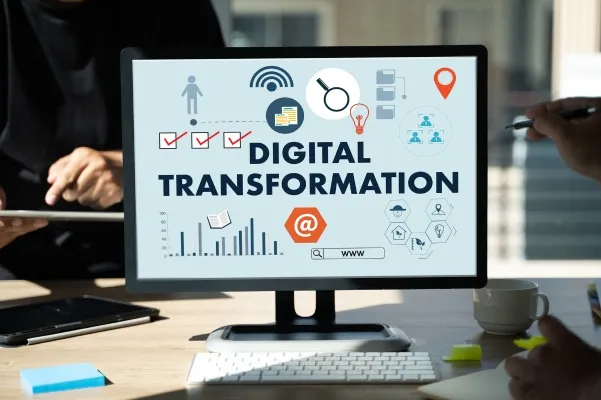Digital Transformation Roadmap 2025: Strategic Implementation Guide for Modern Enterprises

In today's rapidly evolving business landscape, digital transformation has become not just an option, but a necessity for enterprises seeking to remain competitive. Our comprehensive 2025 roadmap provides proven methodologies that help organizations reduce operational costs by 40% while significantly enhancing workforce productivity and customer experience.
Understanding Digital Transformation in 2025
Digital transformation encompasses the complete integration of digital technology into all areas of a business, fundamentally changing how organizations operate and deliver value to customers. Unlike simple digitization, transformation involves a cultural shift that requires organizations to continually challenge the status quo and embrace innovation.
Strategic Foundation: Cloud-Based Infrastructure
The foundation of any successful digital transformation lies in robust cloud infrastructure. Cloud-based IMB platforms provide the scalability, flexibility, and security needed for modern enterprise operations.
Key Benefits of Cloud Infrastructure:
- Scalability: Automatically adjust resources based on demand
- Cost Efficiency: Pay-as-you-use model reduces capital expenditure
- Enhanced Security: Enterprise-grade security with regular updates
- Global Accessibility: Access systems from anywhere, enabling remote work
IoT Integration for Operational Excellence
Internet of Things (IoT) technology forms the backbone of modern digital transformation initiatives. IoT energy management solutions enable organizations to optimize resource consumption while maintaining operational efficiency.
"The integration of IoT devices with cloud platforms has revolutionized how we monitor and optimize our operations. We've seen a 45% reduction in energy costs while improving overall system reliability."
Advanced Gateway Solutions
Seamless connectivity is crucial for digital transformation success. Advanced IoT gateways provide the robust communication infrastructure needed to connect legacy systems with modern cloud platforms.
Gateway Implementation Strategy:
- Assessment Phase: Evaluate existing infrastructure and connectivity requirements
- Design Phase: Develop comprehensive gateway architecture
- Implementation Phase: Deploy gateways with minimal operational disruption
- Optimization Phase: Fine-tune performance and security parameters
ROI Metrics
40%
Cost Reduction35%
Productivity Increase50%
Faster Decision MakingImplementation Roadmap
Successful digital transformation requires a structured approach. Our proven 8-phase implementation roadmap ensures systematic progress with measurable outcomes at each stage.
Phase 1-2: Foundation (Months 1-3)
Establish cloud infrastructure using cloud-based platforms and implement basic connectivity through edge gateways.
Phase 3-4: Integration (Months 4-6)
Deploy energy management systems and water management solutions for comprehensive resource optimization.
Phase 5-6: Automation (Months 7-9)
Implement predictive maintenance systems and HVAC automation for operational excellence.
Phase 7-8: Optimization (Months 10-12)
Fine-tune all systems, implement advanced analytics, and establish continuous improvement processes.
Overcoming Common Challenges
Digital transformation initiatives often face resistance and technical challenges. Understanding these obstacles and having mitigation strategies is crucial for success.
Change Management
Employee resistance to new technologies can significantly impact transformation success. Comprehensive training programs and clear communication about benefits help overcome these challenges.
Legacy System Integration
Older systems may not integrate seamlessly with modern platforms. On-premise IMB platforms provide hybrid solutions that bridge legacy and modern systems.
Measuring Success
Establishing clear KPIs and measurement frameworks is essential for tracking transformation progress and demonstrating ROI.
| Metric Category | Key Performance Indicator | Target Improvement |
|---|---|---|
| Cost Optimization | Operational Cost Reduction | 40% |
| Productivity | Process Efficiency | 35% |
| Customer Experience | Response Time Improvement | 50% |
| Innovation | Time to Market | 30% |
Future-Proofing Your Transformation
Digital transformation is an ongoing journey, not a destination. Building adaptable systems and maintaining a culture of continuous improvement ensures long-term success.
Emerging Technologies to Watch:
- Artificial Intelligence and Machine Learning
- Edge Computing and 5G Connectivity
- Blockchain for Supply Chain Transparency
- Augmented Reality for Training and Maintenance
Ready to Start Your Digital Transformation Journey?
Our expert team has successfully guided 500+ enterprises through comprehensive digital transformation initiatives. Let us help you achieve operational excellence and sustainable growth.
Get Your Free ConsultationConclusion
Digital transformation in 2025 requires a strategic, phased approach that combines cloud infrastructure, IoT integration, and comprehensive change management. Organizations that follow our proven roadmap can expect significant improvements in operational efficiency, cost reduction, and customer satisfaction.
The key to success lies in starting with a solid foundation of cloud-based platforms, implementing robust connectivity through IoT gateways, and gradually introducing specialized solutions like energy management and predictive maintenance systems.
Related Topics:
Explore More Insights
Discover more expert insights on digital transformation and IoT solutions
View All Articles